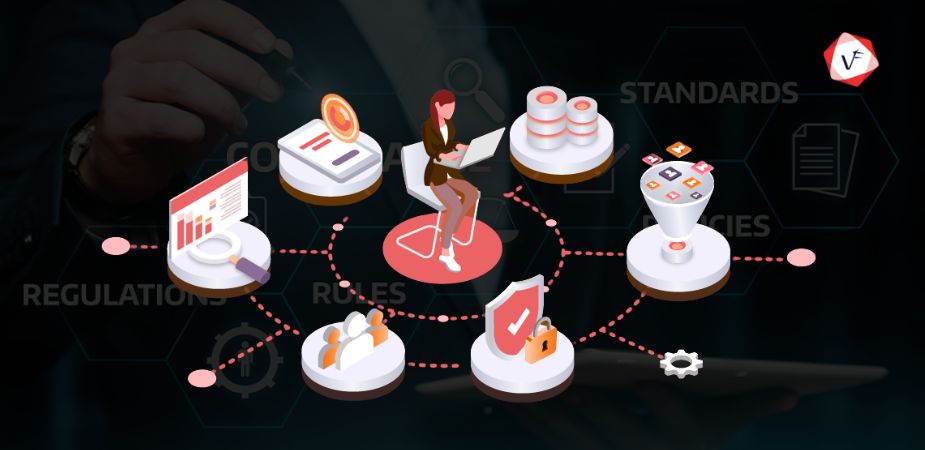- September 22, 2025 2:45 pm
- by Safvana
- September 22, 2025 2:45 pm
- by Ajanth

In the current digital era, data is frequently seen as an organization's vital force. From customer information to financial records, businesses rely heavily on data to make informed decisions, gain insights, and maintain a competitive edge. However, with the increasing volume, velocity, and variety of data being generated, organizations face significant challenges in managing and protecting this valuable asset.
Data governance can be defined as a set of processes, policies, standards, and controls that ensure data is managed effectively, securely, and in compliance with regulations and business objectives. It encompasses the strategies and practices that organizations employ to manage their data throughout its lifecycle, from collection and storage to usage and disposal.
At its core, data governance is about establishing accountability, transparency, and trust in an organization's data assets. It involves defining roles and responsibilities for data management, establishing data quality standards, and implementing mechanisms for monitoring and enforcing compliance.
Data governance is crucial in today's data-driven landscape because it serves as the backbone for maintaining the accuracy, security, and usability of organizational data. Beyond regulatory compliance and risk management, it enhances operational efficiency by streamlining data processes and empowers strategic decision-making through reliable insights.
Moreover, by fostering transparency and accountability, data governance nurtures customer trust, laying the groundwork for innovation and sustainable growth. In essence, it's not just about managing data—it's about unlocking its transformative potential to drive organizational success in an increasingly complex and competitive environment.
Effective data governance comprises several critical components that work together to create a comprehensive framework for managing organizational data:
These are the foundational principles that guide how data should be managed within an organization. Policies define the rules and guidelines for data usage, access, security, privacy, and compliance, while standards establish the specific criteria and best practices for implementing these policies.
Data stewards are individuals or teams responsible for overseeing and managing specific data assets. They ensure that data is accurate, consistent, and aligned with organizational goals. Data stewards collaborate with various stakeholders to resolve data-related issues, define data requirements, and enforce data policies.
Maintaining high-quality data is essential for making informed decisions and achieving business objectives. Data governance initiatives often include processes and tools for assessing, monitoring, and improving data quality. This may involve data profiling, cleansing, deduplication, and validation to ensure that data is accurate, complete, and relevant.
Protecting sensitive data from unauthorized access, breaches, and misuse is a critical aspect of data governance. Organizations must implement robust security measures, such as encryption, access controls, and data masking, to safeguard their data assets. Additionally, data governance frameworks address privacy concerns by ensuring compliance with regulations such as GDPR, CCPA, and HIPAA.
Data governance encompasses the entire lifecycle of data, from creation to archival or disposal. Organizations need to establish policies and procedures for managing data throughout its lifecycle, including data acquisition, storage, retention, and deletion. This ensures that data is retained only as long as necessary and disposed of securely when no longer needed.
Implementing effective data governance offers numerous benefits for organizations, including:
Improved Data Quality: By enforcing data standards and implementing quality management processes, organizations can enhance the accuracy, consistency, and reliability of their data.
Enhanced Decision-Making: Access to high-quality, trustworthy data enables better decision-making, as stakeholders can rely on accurate information to drive strategic initiatives and operational activities.
Reduced Risk and Compliance: Data governance helps mitigate risks associated with data breaches, regulatory non-compliance, and reputational damage by implementing security controls and ensuring adherence to data protection regulations.
Increased Efficiency and Productivity: Streamlining data management processes and reducing data inconsistencies can improve operational efficiency and productivity, allowing organizations to focus resources on value-added activities.
Fostered Trust and Transparency: By establishing clear accountability and governance structures, organizations build trust with stakeholders and demonstrate transparency in how data is managed and used.
Data governance, despite its numerous benefits, also presents a set of challenges that organizations must navigate:
Complexity of Data Ecosystems: Organizations often grapple with managing vast and diverse data ecosystems, encompassing structured and unstructured data from various sources. This complexity makes it challenging to establish comprehensive governance frameworks that cover all data types and formats.
Data Silos and Fragmentation: Data silos, where information is segregated across different departments or systems, pose a significant obstacle to effective data governance. Breaking down these silos and ensuring seamless data integration remains a persistent challenge for many organizations.
Lack of Awareness and Ownership: Data governance initiatives require buy-in and participation from stakeholders across the organization. However, a lack of awareness or understanding of data governance principles and practices can hinder adoption. Additionally, defining clear ownership and accountability for data stewardship responsibilities can be challenging in large, decentralized organizations.
Data Quality Management: Maintaining data quality is a continual challenge, as data is prone to errors, inconsistencies, and duplication. Data governance efforts must address issues such as data cleansing, validation, and enrichment to ensure that organizations can trust the accuracy and reliability of their data.
Balancing Security and Access: Achieving the delicate balance between ensuring data security and enabling appropriate access for authorized users is another challenge. Organizations must implement robust security measures to protect sensitive data while still facilitating data access for legitimate business purposes.
Addressing these challenges requires a concerted effort from organizations, encompassing strategic planning, investment in technology and talent, stakeholder engagement, and a commitment to continuous improvement. While the road to effective data governance may be fraught with obstacles, the rewards—such as improved decision-making, enhanced compliance, and increased operational efficiency—are well worth the effort.
In conclusion, data governance plays a vital role in helping organizations maximize the value of their data assets while mitigating risks and ensuring compliance. By establishing robust governance frameworks and embracing data stewardship principles, organizations can harness the power of data to drive innovation, gain competitive advantage, and achieve their business objectives in today's data-driven world.
In addition to the aforementioned benefits, it's crucial to emphasize the long-term significance of data governance in fostering a culture of data-driven decision-making and innovation within organizations. By institutionalizing data governance practices, businesses can adapt more readily to evolving market dynamics, emerging technologies, and regulatory requirements.
Furthermore, as data continues to grow in complexity and volume, the need for effective data governance will only intensify. Organizations that prioritize data governance today are better positioned to capitalize on future opportunities, mitigate risks, and maintain a competitive edge in an increasingly data-centric landscape.
Transform your organization's data management strategy with comprehensive data governance frameworks. Get expert guidance on implementing effective data governance practices tailored to your business needs.
Guaranteed Response within One Business Day!
What is Infrastructure as Code (IaC)?

Front-End Performance in 2026: What Core Web Vitals Actually Mean for Your Site

What is FinOps?

Micro-Frontends: Breaking Down Monolithic React Applications
.png)
Zero-Trust Security Models for SaaS: What You Need to Know